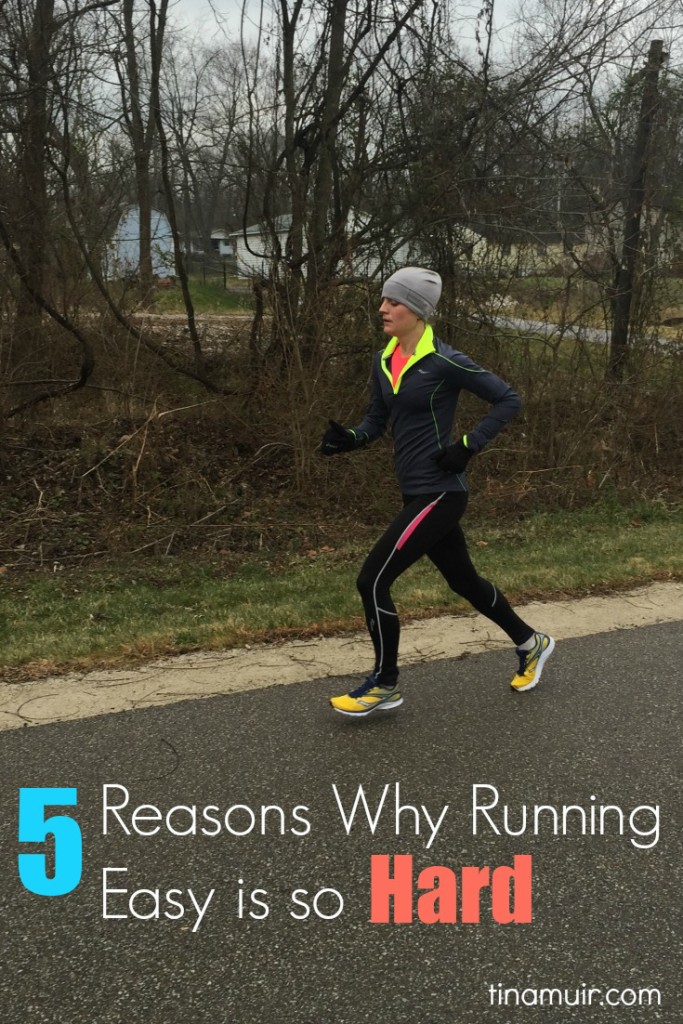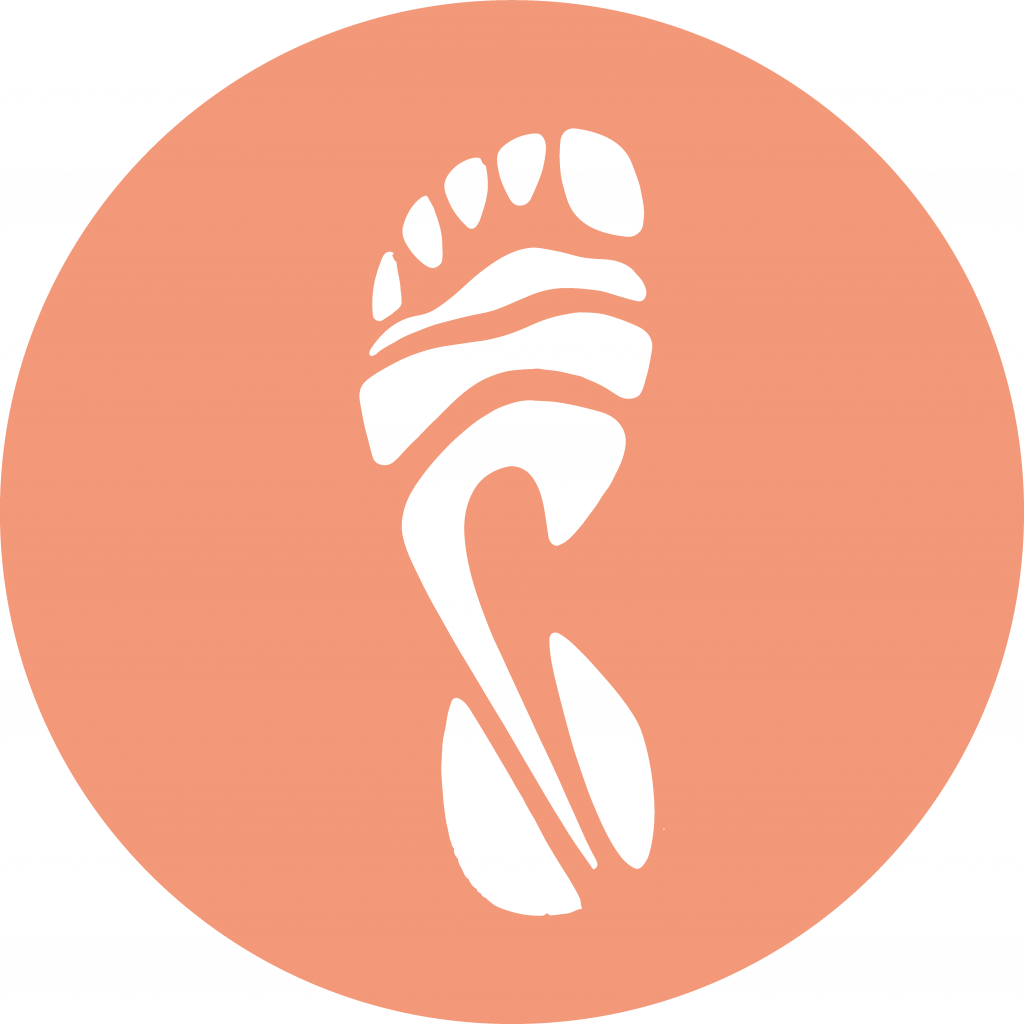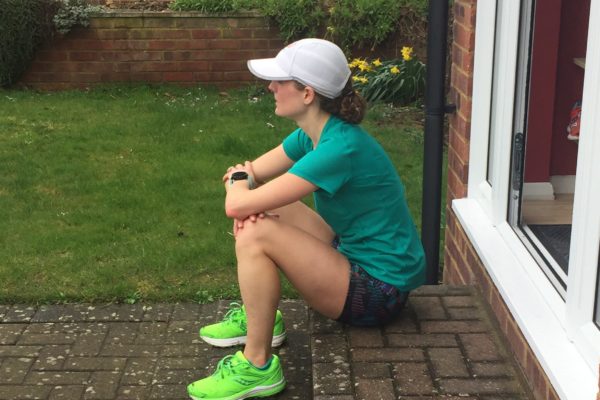Although there are many benefits of running, the one that lures most of us is the success we get when we run faster. The endorphin rush is better, the satisfaction and pride is strong, and it feels good to know your hard work is paying off.
Sometimes though, when you have run too hard, either the day before, or for a few days before, it can be easy to wonder, why am I not getting better at running or why is my pace getting slower?
It seems logical, right?
If you run faster in your daily runs, then you will get faster.
Unfortunately, that is not true, and it goes one step beyond this. If you do not do most of your runs at a slow and easy pace, one of three things will happen to you; overtraining, injuries, burnout.
Either way, the result is that you can no longer run.
This becomes even more important if you are marathon training.
Once the accumulated fatigue from weeks of training builds up, the recovery after a long run becomes even more important, and will take longer.
Today I wanna focus on recovery runs and how they will help you.
What is a Recovery Run?
The definition of an easy run is exactly what it sounds like.
It isn’t a trick.
You want to run at a slow pace (regardless of how “fast” or “slow” of a runner you think you are), and you want it to feel like you could do it all over again.
Yes, that easy.
I gave you some other suggestions in this article about how to make sure you are running easy enough, so head over there if you are still struggling to understand how to run a slower pace that will allow your body to recover.
Today, I want to focus on why we struggle with it.
Let’s see how many of these you agree with.
Why Easy Days are Important for Recovery
There are a lot of great articles on why it is important to have lots of easy days, and I know we all read those posts, and think it clicks.
We think to ourselves,
“Yes, that makes total sense! From NOW on, I am going to do that, every time I am not doing a hard workout”.
So why then do we come across the same article, written in a different way 3 months later, and think the same thing again?
Here’s the deal:
Running hard puts us in pain, it puts us in a state of discomfort where our mind is screaming at us to stop.
You would think that alone that would be enough to slow us down, and make us want to run at a pace that is enjoyable, and does not provoke those thoughts.
Yet over and over, on our recovery days we end up running too fast.
It all comes down to confidence.
When it is lacking, that is when we look for reassurance within our recovery days, and if we can’t get it through those runs, we start to wonder why we are getting worse at running or why running is so hard for some people.
Let me be frank:
Running is hard for everyone.
As much as I wish I could tell you when running gets easier, it doesn’t.
Running is always going to be hard.
When we are feeling strong, and believe we are in better shape than ever before, we do not feel the need for proving anything on recovery days.
If you have the confidence to trust in yourself that on the longer days and the hard workout days your body will know how to run faster and longer, then you will notice that you keep getting better at running, because you can run your best on the days that matter.
Now:
There are a number of ways we let ourselves get out of control, and risk the one word no runner wants to hear; injured.
These are the ones I sometimes struggle with and how I work on them to make sure I run for recovery not for my ego:
Addicted to your GPS watch
We are staring at that piece of technology on our wrists that tells us what speed our culture has deemed an acceptable running pace.
We have become so reliant on them, and I think it takes away from the beauty of running and its simplicity.
I hate to admit it, but I definitely fall into the trap of looking at it too often, seeing the 8:?? number in my pace is usually followed by a much lower 7:?? mile. (Remember, even thought that may seem fast, my race pace for a marathon is 5:5?).
As much as I try to tell myself not to do it, I struggle not to.
However, I find that when I do leave my garmin at home, or when I cover it up with my sleeve, I feel so much better after the run, as I just ran by what felt good, rather than what I feel like I should be doing.
Stop being too competitive
We end up competing with ourselves if we are running a familiar course that we have timed in the past. Even worse is when we compete against whoever we are running with.
We all know someone who had to run half a step in front of you whenever you run together…..and if you don’t….sorry, its you!
See if this sounds familiar
Sometimes, when running with friends, our egos often get tangled up in a chest puffing match, and the pace quickens as the run goes on.
Before you know it, the stubborn runner in you comes out, and you refuse to back down until you are both sprinting. Ironically, the more courageous one of the two of you, is usually the one who says something, or eventually backs off.
Of course this is always followed by a pointing match, “you started it”!
Next time you sense this coming on, try to be the bigger person, and step back, chances are, they will be glad you did!
Using running to relieve stress
We are beating ourselves up about a previous race/workout, and want to try to prove that it was just a fluke or a bad day.
I don’t know what we are trying to do, as there is only one place that really matters, and that is out on the race course.
I know I am guilty of trying to reassure myself that I am in good shape.
This is often the recovery run that pushes you over the edge…..and you either end up injured, or overtrained.
Slower pace means a slower runner
This is the one I mentioned earlier, but it is worth repeating, as it is the one that is the toughest to get our minds around.
The faster you run every day, the faster you will be….
Sounds like it should make sense, but unfortunately that could not be more wrong.
The year in college where I had injury after injury, was the year where I tried to run at 7:10 pace or better every run…..in addition to the 2 workouts and long run I was doing each week.
At the end of the day, easy runs do not prove anything.
Think about it this way:
If you are going to run a 5k, you cannot just run a 5k every day as hard as you can, and expect each day you will get faster and race well.
Yes, maybe initially, but that isn’t how we train for races.
In the same way we run intervals within our workouts, or change our speed from the warm up to workout and recoveries, we need to make sure we do run easy in between hard days.
Not leaving enough time to run
This is the one Steve gets most mad about. I sometimes do not leave enough time between my run and the next task I have to do/place I have to be.
I therefore end up rushing to make sure I get it all in.
This also relates to another bad one:
Wanting to get it over with.
O those days we really feel like crap, we want to just get home as quickly as possible, and rather than embracing the soreness/tiredness, we put our head down and push.
This is another one where you are asking for trouble.
When it comes down to it, there is no right way to do workouts.
As long as you are getting some hard training in, you will be okay. There are so many different opinions as to what is best, BUT all coaches agree that recovery days are incredibly important.
It takes more strength and courage to run easy than it does to run hard.
Anyone can run hard…..if you are a new runner, you probably run every run hard, and if you keep it up, you will end up paying the price.
You have to be confident enough in yourself to be able to back off the pedal and run easy.
Running easy on your recovery days will make a huge difference in your running.
If running means a lot to you, and being healthy means anything to you, you should keep reminding yourself, and give them as much attention as the hard workouts, as they are what make all the difference.
Even if that means telling yourself (our loud) to slow down during your run. I do that sometimes!
I don’t know about you, but I would rather be slightly less fit, but know I am healthy.
Just in case you needed another one of those “click” moments, here are the Runners Connect easy run posts, all of which are actually a great read, especially if you are not sure what pace to run.
How Do Easy Runs Help You Race Faster?
Maximize Your Running with Planned Recovery Days
The 2 Simple Reasons Your Easy Days are Ruining Your Training
How Running 80% Easy Could Make You 23% Faster
How Do Easy Runs Help You Race Faster (and what exactly your easy pace should be)
It is better to get to the start line slightly less fit, but healthy, than it is to be in super shape…..but you are unable to run!
And if you are still unsure about what your easy pace would be, this is my guide on how to make sure you are running easy enough on your recovery runs.
Which of these are you guilty of? Why do you think we struggle with it so much?
How to Use the Effort Scale Cheatsheet
Get your printout to refer to as you begin effort based training




33 Comments.
I’m so glad you said this! I thought I was crazy when I kept thinking running easy is so much harder than running hard.
Have a wonderful weekend Tina!
This is interesting. I always wonder how easy is too easy (I’m a slacker). My interval and tempo runs are anywhere from 7-8:30 pace depending upon the distance. My easy runs are usually 9:40-10 which seems like a huge spread. It is even slower than my coach tells me to target but I can’t stay in Z2 if I go faster. Then I always start wondering if I’m even making any progress at all…so I guess I have the same issue you describe.
I honestly sometimes think I am the biggest exception on the roads, because I honestly LOVE running easy! I am actually missing MAF training b/c once I got efficient at it, it was a lovely way to go. Maybe my ego left the building a long time ago? But I do know that most runners struggle with this and you nailed the reasons why.
I hate when people say “running is easy” FALSE. That is like saying that pilates is easy or whatever–it isn’t if you are doing it right! But more to the point of this post, “easy running” is difficult because as you said, we get in our own way. And the trick is to still have a difference between easy and hard days, so that easy running is still easy!
Definitely guilty of almost all of these, so thank you for pointing these out and making me more aware! My GPS watch actually broke last weekend, so I have just been using a timer and it has been kind of refreshing. I just RUN! I definitely need to work on realizing that EVERY run does not have to be FAST. Great content Tina! XOXO
Oh, this is great. I struggle with easy runs – probably for all of these reasons. I am trying to do better!
This is a great post! As hard as it is for me to slow down, I do love my recovery days. I had one yesterday and it was really nice…could have been slower but I felt great and it felt easy, so I think that’s ok!
I definitely fall into the trap of wanting to run too hard too often. I think one reason is because most runners enjoy challenging themselves. But I try to be really conscious of running easy and I can’t run without my watch, but I’ll switch the screen or cover it up.
This is probably the best article I have ever read about this. You hit the nail on the head! I’m pinning, posting and re-reading this each time I have an easy day, and I will go confidently into that pace!!! Thanks Tina!
It’s such an insecurity thing for me… “but if I run slow other people will think I *am* slow”. It’s something I really need to work on for definite. At the moment I’m only running three times a week and they’re all quality sessions so easy runs aren’t on the agenda right now, but when they are I think I’m just going to not look at my watch and focus on enjoying the easy pace.
You are so right! Every time I read these arguments I think YES! And then it can be just as easy to forget. For me, it’s definitely the Garmin flashing those numbers back at me. I need to remember to leave it at home for easy run!
I embraced the “easy” run this fall with my running detox- no watch for anything! I imagine it very hard to slow down when you get to your level. Great post!
great article tina! on my easy runs i always remind myself of what i’d read patrick makau once saying – “i train to race fast, not to train fast”.
I run alone 99% of the time but once in a while I’ll run with my well-matched friend Lora and she always pushes me… accidentally. She does this thing where she always has to be a stride ahead of me and so therefore I get this panicky catch-up feeling and I push harder. But she pushes harder to stay a stride ahead of me. And then we end up running our fool faces off. This would be brutal if we did this every day but it works for us as we only run together once every couple of weeks.
Tina, this post could not have come at a more perfect time. I struggled with running easy today, and have felt like I’ve been in a fight with my Garmin this entire training cycle for Boston. In reality, I know that I am incredibly blessed just to be healthy enough to run, compete and participate in marathons. Your posts never fail to reassure, calm and inspire me. We are lucky to have a leader like you out there!
I am a slave to my GPS and I really need to start using it less. I find that it helps me though because I have a tendency to start off to fast and it allows me to reel it back in when I need to!
Considering I only run “easy”, haha I can’t relate! My pace is always somewhere in the 11 minute mark!
Loved this post, Tina! I definitely struggle with running too quickly on easy runs. Even though I know better, there’s still that little voice in my head that says, “Run faster if you want to get faster!” Thanks for the wonderful advice! <3
Easy runs are the hardest part of any training plan for me. I am so guilty of just pushing it a little bit too fast. I’ve noticed since being pregnant and not relying on my Garmin that it’s much easier to check in with my body. The Garmin is definitely my sticking point during training – I always tell myself I’m going to run naked on my easy runs and then I freak out and have to have it. I am going to make a concerted effort when I get back into running properly after this baby to be more mindful of listening to my body rather than relying on data and not pushing the easy run pace. Great article, Tina!!
Right now all I can do are easy runs- but because I let my body heal, I ran 5 pain free miles today! I may be back on the road to Boston. Like you said, better to show up not as fit than to not show up at all. As always you have the best advise. Hope your recovery RnR is going well. xoxo
Really good points and I think lots of people forget them and get caught up and then ending up getting injured.
I’ll admit, I’m a slave to the Garmin during my tempo runs and speed workouts. However, for this very reason, I totally forget about it when I do my easy runs. I take it with me to keep track of mileage and I don’t even need to cover it up with a sleeve anymore – I just don’t feel the need to look at it! Such a great feeling.
I agree and there is definitely such a thing as “overfit” – mind you, that isn’t a concern for me right now
All these points are soooo true! On easy runs I sometimes turn my Garmin so I can’t easily see my mile splits – it keeps me from picking up the pace too much. I used to be so bad about speeding up because I had not given myself enough time to run before having to be somewhere – now I calculate how long I’ll be gone off of 9 minute miles, even though my easy run pace is faster – that way I have extra time!
It IS so hard! /i definitely blame my ego and my logical brain (run faster and you’ll be faster). I know that this is definitely something to work on and glad to know everyone struggles with it!
Great post! I started to focus on running easy after reading the Hansons Methond book. I now use a heart rate monitor to make sure I’m not going too fast. Because I’m a slow runner to begin with, it was almost painful to see my pace get slower…so I switched my Garmin screen to only show heart rate & not pace at all. After just a few months doing this, my pace has gotten much faster at the same low heart rate, and I feel fitter & stronger than ever before. Plus, I’m able to nail my paces on my hard workouts. And I continue to be injury-free. I’m a believer!
I think the biggest thing for me is not slowing down enough on the recovery/slow runs. The big “OMG” moment was when Lauren Fleshman posted a part of her training log and her recovery paces were upper 8’s during a run and I kind of sat there like, “Hmm. If her recovery runs are only about a minute off from what I think my recovery runs should be, I’m definitely not running slow enough.”
I personally think heart rate training can also be such a huge help! If you’re reliant on a Garmin, etc. device – pair it with heart rate training and I bet you think you’re on the ‘easy’ pace train, but your heart is telling you otherwise.
I wish I could say that any sort of running was easy, but I can see what you mean for those that are serious about it! I’m the same way with yoga – I really dig my power classes and sometimes the restorative ones just don’t feel like I’m getting as much out of it (even though I know I really am!). Thanks for sharing!
So true, all so true! I am sometimes guilty of not leaving myself enough time – and rushing to fit it all in!
Great post (as always!) Tina! Have a great weekend. xo
Yes! Yes! yes! This was my mental struggle/battle with my long (easy) run last week. It was a struggle physcially… but OH I had so many of these items listed above making my easy run… hard.
I agree – I think the time thing is the big one. I will start out slower but then I just think if I ran faster I could be done quicker:)
I need to slow down. I still lack the confidence to run 8:xx because it feels like I’m losing ground somehow. I know better, I just need to find some self-discipline. When I up the mileage and start running faster during my training runs, my race times always suffer. Thanks for the reminder.
I stumbled upon this pattern for a recovery run that I like a lot. I normally run 6 miles at a very slow pace for a recovery session. But it is very boring to go so slow for an hour, and I usually feel worse afterwards, stiff and tight. So try this: Run 10 minutes at a slow, almost warmup jog pace. Then start a 5 minute countdown timer on your watch. Run another 5 minutes very slow. Then for the next five minutes, pick it up just a little bit. In another five minutes, pick it up some more, but still going nice and easy. Then slow down to the original pace for the next five minutes, and repeat the cycle again a couple more times. Fix it so that the last five minutes are at the very slow pace. I think you’ll find that the slight variations in paces loosens you up a little better and makes the run a bit less dull.